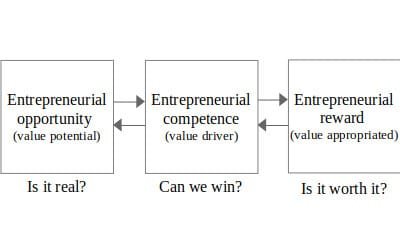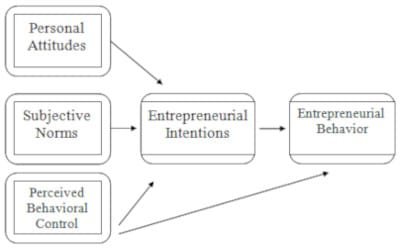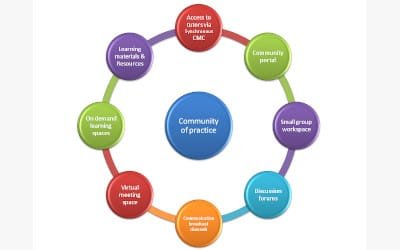A Unique Entrepreneurial Path: Sir Richard Branson
Published in 2016

Introduction
This short report aims to analyse the area of entrepreneurship, with specific reference to the entrepreneurial abilities, skills, and success of Sir Richard Branson.
The idea of entrepreneurship is essentially broad and entails a host of meanings and definitions. Entrepreneurs have been idealistically defined as people with extremely rare characteristics and high capacity for bringing about beneficial change (Burns, 2013, p 5). Cynics oppose such a view and state that all people who wish to work for their own selves should be thought to be entrepreneurs (Hisrich et al., 2010, p 41). Joseph Schumpeter associates entrepreneurship with the development of diverse innovations in areas of products, markets, working processes and organisational forms (Hisrich et al., 2010, p 41). Most dictionaries, however, stick to defining entrepreneurs as individuals who set up, handle, and take on the diverse risks of business enterprises (Hisrich et al., 2010, p 41).
There is little doubt of the important roles played by entrepreneurs in economic development, more so in contemporary times (Burns, 2013, p 7). They are constantly creating employment, developing technologies, products and services, and contributing to national GDP (Pinchot & Pellman, 2000, p 21). This report analyses entrepreneurial activity from the perspectives of a) entrepreneurial characteristics or DNA, making use of the traits, cognitive, situational and other theories and (b) entrepreneurial leadership. This analysis is carried out with specific reference to Sir Richard Branson, the founder of The Virgin Group and one of Britain’s most well-known business entrepreneurs.
The report evaluates the entrepreneurial abilities of Branson with the help of theoretical models and a specific audit sheet. It ends with a summative conclusion.
Critical Analysis and Discussion
Overview of Richard Branson’s Entrepreneurial Career
Richard Branson was born in 1950 into an affluent British family (Beachley, 2013, p 1). Son of a well-known barrister, he suffered from dyslexia and performed poorly as a student. He commenced his entrepreneurial career when he was 16 with the publication of a magazine called The Student (Beachley, 2013, p 1). This was followed by the establishment of a mail-order business for audio records in 1970 and the opening of a chain of audio record stores in 1972 (Beachley, 2013, p 1).
He has since gone on to establish approximately 360 companies, which are valued at about 25 billion dollars and employ 55,000 people (Lair, 2013, p 1-2). His personal wealth is estimated at about 4.2 billion USD, which makes him the fourth richest individual of the UK (Lair, 2013, p 1-2). Branson was knighted in 1999 for his services to entrepreneurship and has been bestowed with a number of national and international awards (Lair, 2013, p 1-2). Some of his better known ventures are Virgin Records, Virgin Atlantic, Virgin Media, Virgin Blue Australia and Virgin Galactic (Jali, 2009, p 6). Appendix A provides a synopsis of his activities from the 1980s to the 2000s.
The information available on him in the public media reveals the following information.
- His main characteristics appear to be (a) an inquisitive and searching mind, (b) an ability to find good people and inspire them to perform at extraordinary levels, (c) an innovative approach to business and (d) an ability to connect with people (Entreprenuer.com, 2009, p 1). He appears to be a hands-on person, learning by doing things rather than by reading about them (Entreprenuer.com, 2009, p 1).
- He has a genius for public relations and is able to handle media very effectively (Sicinski, 2009, p 1).
- He listens to people, encourages them to communicate and voice their opinions and integrates them into his organisation (Lair, 2013, p 1-2).
- He appears to be original and creative, flexible and open-minded, and an avoider of conflict (Sicinski, 2009, p 1).
- He does not appear to be interested in controlling others and prefers to lead by empowering his employees, listening to their ideas and energising them towards better performance (Sicinski, 2009, p 1).
- His focus is on bringing about change through the development of vision, the securing of dedication and commitment and the empowering of employees (Entreprenuer.com, 2009, p 1).
- He appears to be extremely innovative in his approach and is ready to take risks.
- His organisations have flat structures with employees being given significant responsibilities (Jali, 2009, p 2).
- His leadership style is participative, democratic and charismatic, rather than autocratic and authoritative (Jali, 2009, p 7).
Entrepreneurial Characteristics
Entrepreneurs have traditionally been associated with specific characteristics or traits that force them to move away from employment or professional life and take up entrepreneurial activity (Burns, 2008, p 56).
The personality traits theory argues that entrepreneurs have some particular psychological traits, i.e. (a) need for achievement, (b) tolerance for ambiguity, (c) propensity to take risks and (d) locus of control (Burns, 2008, p 56). Such people are driven by their need to achieve, which leads to sustained activity in specific areas for the achievement of personal satisfaction without too much worry about the consequences of failure (Burns, 2008, p 57). Their tolerance for ambiguity keeps them comfortable in situations that are not very clear and can develop in different ways. Such people welcome uncertainty and try to look for opportunities in uncertain situations (Burns, 2008, p 59).
Whilst many people think of entrepreneurial propensity to take risks as a foolhardy characteristic, entrepreneurs, by and large, assess various risks and determine the probability of occurrence of events (Oden, 1997, p 72). They have the ability to assume risks, rather than be cowed by them. With regard to locus of control, entrepreneurs believe that they have the ability to control and determine the course of their lives (Oden, 1997, p 72). This trait clearly distinguishes them from people with an external locus of control who believe that their lives are controlled to a great degree by the external environment (Oden, 1997, p 72).
Joe Abraham (2011, p 16) states that entrepreneurs cannot be classified through a one-size-fits-all approach and should actually be placed in categories like (a) builders, (b) opportunists, (c) specialists and (d) innovators. Entrepreneurship is furthermore associated with certain other characteristics like innovative ability, self-confidence, drive and determination, vision and the ability to live life with greater uncertainty and risk (Heller, 2009, p 9).
The traits theory continues to be extensively used for the determination of entrepreneurial skills and abilities (Morris et al., 2007, p 43). Contemporary experts, however, argue that the profiling of entrepreneurs solely by personality characteristics is rather one dimensional and basically inaccurate (Morris et al., 2007, p 43). Most entrepreneurial studies have non-homogeneous samples, attribute numerous flattering traits to entrepreneurs and depict them as larger than life characters (Morris et al., 2007, p 43). The cognitive approach, which opposes the traits model, argues that individual personalities change with time and do not respond similarly in all situations (Morris et al., 2007, p 45). It states that diverse entrepreneurial skills and abilities can be learnt or acquired with effort and focuses on characteristics like reasoning, judgement, awareness and perception (Morris et al., 2007, p 45). The situational theory, on the other hand, argues that entrepreneurial activity is very often dictated by specific circumstances like education, family and community background, employment and immigration (Morris et al., 2007, p 45).
As evident from the above analysis, entrepreneurial activity is an extremely complex process and whilst traditional theories have associated the phenomenon mostly with specific individual traits and characteristics, contemporary academics feel that entrepreneurial abilities can be learnt, acquired and developed over time (Timmons & Spinelli, 2008, p 23). The decision to engage in entrepreneurship is also often influenced by various situational peculiarities like type of education, family background, employment status and immigration (Timmons & Spinelli, 2008, p 23).
The analysis of Richard Branson’s career and his management style also appears to ratify these various theories. His poor performance in school can be perceived to be a motivating factor for his taking up entrepreneurial activity at a very young age. He appears to have a number of entrepreneurial characteristics like propensity to take risks, locus of control and comfort with ambiguity. He is also seen to be an inveterate learner, who is constantly searching not only for new ideas, but also new areas of activity. His motivation is internal and his need for achievement stems from the desire for personal satisfaction.
Entrepreneurial Leadership
Entrepreneurs have by and large been associated with leadership. The development of successful business organisations, like the Virgin Group or Microsoft, is inherently associated with the controlling of activities of numerous individuals for the furtherance of organisational objectives and the realisation of the mission and the strategic vision of the founders of business enterprises.
The academic area of leadership also contains an abundance of theories, the more important of which are (1) the traits theory, (2) behavioural theories, (3) participative leadership theories, (4) situational leadership theories, (5) contingency theories, (6) transactional leadership theories and (7) transformational leadership theories (Burns, 2013, p 126). The traits theory in leadership is very similar to the personality theory in entrepreneurship and associates successful leaders with the possession of specific traits like desire to lead, energy, intelligence, ability, responsibility, judgement, confidence and courage, honesty and ethics and ability to motivate people (Burns, 2013, p 126). The behavioural theory argues that leaders possess particular behavioural patterns likeability to direct, concern for mission, readiness to share decision making and empathy for individuals (Burns, 2013, p 126).
Contingency theories argue that leadership often arises from circumstances and leaders of diverse types arise in diverse situations. Fiedler (1997, p 7), states that leadership is often situational and constancy in the adoption of a specific leadership style is not always productive. Modern leadership theory distinguishes between transactional and transformational leadership and stresses upon the need for leaders to be transformational in their approach. Transactional leaders focus on the maintenance and operations of organisations through various promises, incentives and rewards, even as transformational leaders strive to bring about organisational advancement and change through the (a) enhancement of awareness of employees, (b) alteration of their personal needs (Morris et al., 2007, p 56).
Such leaders motivate employees to move away from self-interest, follow larger organisational objectives and go beyond their ordinary responsibilities for the achievement of organisational benefit (Morris et al., 2007, p 56). They bring about critical organisational change and are felt to be imperative for corporate progress. Leadership theory also categorises leadership styles into (a) authoritarian, (b) democratic, (c) coercive, (d) affiliative, (e) coaching by nature and (f) pace setting forms. These styles are again not exclusive to specific leaders and have their own advantages and disadvantages (Morris et al., 2007, p 56).
Branson’s leadership is very evidently transformational in nature. He is democratic and participative in his approach and shares knowledge with his employees. His behaviour is supportive rather than authoritarian and directive. He uses his personality to motivate his employees, welcomes different ideas, and is very clearly inspirational and collaborative, rather than authoritative or directive in his approach.
Evaluation of Sir Richard Branson’s Entrepreneurial Abilities
The evaluation of Branson’s entrepreneurial abilities and skills is conducted with the help of an audit that gauges different aspects of his entrepreneurial and leadership characteristics and is provided in Appendix 2. There is significant evidence available in the public domain that corroborates his success as an entrepreneur in terms of establishment of business enterprises, generation of employment and creation of personal and organisational wealth. He has, in a period of less than 50 years, created more than 300 profitable enterprises that provide employment to 55,000 people and have assets exceeding 25 billion USD. Starting from scratch, he has achieved a personal wealth in excess of 4 billion USD.
The score of his audit for entrepreneurial characteristics is 79 out of 108, i.e. 73.15%. His entrepreneurial ability thus appears to be significantly high. The assessment of his leadership characteristics reveals him to be a democratic, participative and transformational leader. These qualities make him suitable to lead organisations in today’s knowledge-intensive contemporary society.
Conclusions and Recommendations
This report investigates and analyses different dimensions of entrepreneurship, with specific reference to the case of Sir Richard Branson, the founder of the Virgin Group of Companies. Whilst entrepreneurship and leadership are both complex areas of human activity, much of academic research and theory in these areas dwell on the traits of entrepreneurs and leaders. A number of other theories have, however, emerged, many of which look at entrepreneurship and leadership from other perspectives. The cognitive theory in entrepreneurship and the situational and transformational/transactional theories in leadership are of significant relevance in this regard.
The information available upon Richard Branson in the public domain, when analysed in the context of various academic models and theories, reveal him to possess significant entrepreneurial traits. These appear to have influenced his business career to a great extent. His leadership style is revealed to be participative, democratic and transformational, which is in consonance with the leadership demands of modern organisations operating in an intensely competitive environment.
References
Abraham, J., (2011), Entrepreneurial DNA: The Breakthrough Discovery that Aligns Your Business to Your Unique Strengths, 1st edition, NY: McGraw-Hill.
Beachley, A., (2013), “Sir Richard Branson”, Available at: www.thextraordinary.org/sir-richard-branson (accessed March 05, 2013).
Bio.com, (2013), “Richard Branson: biography”, Available at: http://www.biography.com/people/richard-branson-9224520 (accessed March 05, 2013).
Burns, P., (2013), Corporate Entrepreneurship: Innovation and Strategy in Large Organisations, 3rd edition, Basingstoke: Palgrave Macmillan.
Burns, P., (2008), Corporate Entrepreneurship: Building the Entrepreneurial Organisation, 2nd edition, Basingstoke: Palgrave Macmillan.
DePaul, C. V., (2008), Creating the Intrapreneur: The Search for Leadership Excellence, USA: Synergy Books.
Entreprenuer.com, (2009), “Richard Branson: Virgin Entrepreneur”, Available at: www.entrepreneur.com/author/87 (accessed March 05, 2013).
Factspy.net, (2013), “11 facts about Sir Richard Branson”, Available at: http://factspy.net/11-facts-about-sir-richard-branson/ (accessed March 05, 2013).
Fiedler, F. E., (1997), “Situational control and a dynamic theory of leadership”, in K. Grint (ed.), Leadership, Classical, contemporary and critical approaches, Oxford: Oxford University Press.
Hisrich, R. D., Peters, M. A., & Shepherd, D. A., (2010), Entrepreneurship, 8th edition, Burr Ridge, IL: McGraw-Hill/Irwin.
Heller, H., (2009), Corporate Entrepreneurship: An Overview of Intrapreneurship in the United States, Saarbrücken, Germany: VDM Verlag.
Ignatova, M., (2012), “Sir Richard Branson Shares Entrepreneurship Lessons”, Available at: blogs.salesforce.com/…/sir-richard-branson-at-dream… (accessed March 05, 2013).
Jali, S., (2009), “Sir Richard Branson”, Available at: http://www.slideshare.net/shrayjali/sir-richard-branson (accessed March 05, 2013).
Joel, (2012), “Richard Branson’s 7 Rules to Live by for the Ultimate Success”, Available at: addicted2success.com/success…/richard-bransons-7-rules-to-li… (accessed March 05, 2013).
Lair, M., (2013), “Sir Richard Branson: An Entrepreneurial Knight”, Available at: http://mayrsom.wordpress.com/2013/03/01/sir-richard-branson-an-entrepreneurial-knight/ (accessed March 05, 2013).
Lim, A., (2007), “The 7 attributes an entrepreneur should have”, Available at: blog.alvinlzg.com/category/business-2/entrepreneurship/ (accessed March 05, 2013).
McCraw, T. K., (2007), Prophet of Innovation: Joseph Schumpeter and Creative Destruction, USA: Belknap Press.
Morris, C., Kuratko, D., & Covin, J., (2007), Corporate Entrepreneurship & Innovation, 2nd edition, USA: South-Western College.
Oden, H., (1997), Managing Corporate Culture, Innovation & Intrapreneurship, UK: Quorum Books.
Orkestra, (2008), “The role of Corporate Entrepreneurship in the current Global Economic Turmoil”, Available at: www.orkestra.deusto.es/index.php?…the-role-of-corporate-ent… (accessed March 05, 2013).
Pinchot, G., & Pellman, R., (2000), Intrapreneuring in Action: A handbook for Business Innovation, San Francisco, USA: Berrett-Koehler.
Samli, A. C., (2009), International entrepreneurship: Innovative solutions for a fragile planet, New York: Springer.
Sicinski, A., (2009), “Richard Branson Secrets to Success”, Available at: blog.iqmatrix.com/richard-branson (accessed March 05, 2013).
Timmons, J., & Spinelli, S., (2008), New Venture Creation: Entrepreneurship for the 21st Century, 8th edition, NY: McGraw-Hill/Irwin.
Zucchella, A., & Scabini, P., (2008), International entrepreneurship: Theoretical foundations and practices, New York: Palgrave Macmillan.
Appendices
Appendix 1: Richard Branson’s important achievement in the Last Three Decades
1980 | 1990 | 2000 |
Virgin records goes international | Virgin Megastores arrives in Japan | Virgin launches Virgin Blue |
Virgin Atlantic Airways and Virgin Cargo are launched | Virgin publishing (Virgin books) is formed | Virgin launches Virgin Galactic |
Virgin Group now includes record labels, retail outlets, exported music publishing, broadcasting, satellite television and film and video distribution | Virgin record is sold to Thorn EMI | Virgin launches Virgin Health Bank |
Virgin launches Virgin Airship and Baloon Company | Launch of Virgin Vodka and Virgin Cola | Virgin launches Virgin Media |
Virgin Express, a European low cost Airline is launched in Brussels. | Virgin Fuel US $ 400 million in Virgin Atlantic jet flight on biofuels and in renewable energy | |
Virgin mobile launches Virgin’s first telecom venture |
(Source: Jali, 2009, p 6)
Appendix 2: Entrepreneurship Audit
Entrepreneurial Characteristics | Score(1 to 12) |
Need for Achievement | 8 |
Tolerance for Ambiguity | 9 |
Propensity to take Risks | 8 |
Locus of Control | 9 |
Independence | 9 |
Creativity | 9 |
Drive/Determination | 9 |
Autonomy | 9 |
Learning | 9 |
Leadership Style | Style |
Democratic/Authoritarian | Democratic |
Participative/Coercive | Participative |
Transformational/Transactional | Transformational |
More From This Category
Innovation & Change are Central to Value Creation
The achievement and effective use of knowledge is widely accepted by contemporary managements, theoInnovation, as a concept, has been examined and developed over time, which, in turn, has resulted in the creation of several definitions. Innovation entails the conversion of an idea into a solution that results in addition to value from the perspectives of customers. Customers are unlikely to change their buying behaviour if an innovative product does not result in value addition for them. Innovation involves the application of useful and novel ideas; creativity comprises the seed of innovation but is likely to remain in the realm of idea generation until and unless it is applied and scaled suitably).
Organisational change constitutes the process of alteration of organisational strategies, processes, procedures, technologies, and culture.rists and researchers to be the chief source of competitive advantage of modern day business organisations.
Theories of Entrepreneurial Opportunity
The study of entrepreneurship isn’t just about admiring successful entrepreneurs from afar. It’s about digging deep into why they do what they do, when they do it, and how it all plays out in the end. It’s like peeling back the layers of an onion to uncover the juicy bits inside.
And to tackle these burning questions, we’ve got two heavyweights in the ring: the Discovery Theory and the Creation Theory. These bad boys are all about figuring out why humans do what they do and how it helps them achieve their goals.
Behavioural Theories and Entrepreneurship
Management and behavioural experts have delved into entrepreneurship extensively, and there’s a whole body of work on the topic. Lazear paints a broad picture, defining an entrepreneur as someone who starts a new venture. But that definition lumps together someone opening a small local business with giants like Jeff Bezos or Steve Jobs. Sure, there’s some truth there, but it’s tricky to draw general conclusions about entrepreneurship because it comes in so many shapes and sizes. Entrepreneurship research tackles big questions like why some people dive into entrepreneurial ventures while others with similar talents and energy don’t, and why some spot entrepreneurial opportunities while others miss them.
Tesla: Critical Evaluation of Corporate Social Responsibility and Global Innovation Management
Established in 2003, Tesla Motors, the US-headquartered manufacturer of electric vehicles, solar panels and solar roof tiles, has become globally famous for its pioneering, innovative and entrepreneurial efforts in the development of electric vehicles and renewable energy. The firm has grown phenomenally in the last two decades and is now one of the most valuable corporations in the world. Its CEO Elon Musk is currently one of the the wealthiest persons in the world
Competitive Advantage through the Learning Organisation
The achievement and effective use of knowledge is widely accepted by contemporary managements, theorists and researchers to be the chief source of competitive advantage of modern day business organisations.
Communities of Practice in Knowledge Transfer
The achievement and effective use of knowledge is widely accepted by contemporary managements, theorists and researchers to be the chief source of competitive advantage of modern day business organisations.







0 Comments